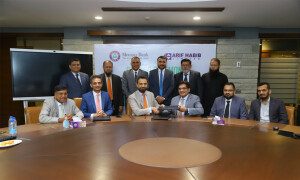The Federal Tax Ombudsman's (FTO) jurisdiction is in relation to federal tax laws. All said, done and experienced, there is a superstructure to attend tax payers' grievances with reference to laws administered by FBR. There is an Appellate Tribunal, an ADR system, besides a battery of seasoned officers understanding fiscal laws, in the field and at FBR headquarter.
How the machine operates and what ails that, is a different subject. Above all, there is an FTO whose bold, judicious orders one keeps coming across, courtesy Daily Business Recorder. Another strong feature of FBR administered laws is that, for very many years, FBR related network has tested vagaries of administrative and legal dispensations, substantially crystallised also by Tax Bar Association. However, the Karachi Tax Bar Association does not appear visible in relation with law and administration of Sindh Sales Tax on Services Act. Also probably because it is more engaged by professionals in income tax practice.
The SRB has a long way to get to the level of FBR maturity. Officers of SRB relatively much younger, not that officious, do not appear 'wise' in the sort of detested lores their counterparts in similar traits may be.
Obviously, grip of the SRB officials on the tax jurisprudence leaves much to be desired. They issue notices by hundreds. There are instances when these notices do not bear signature of the issuing officer. Excuse - paucity of time. They appear zealous to fill coffers of the Sindh government, relying only on concept of law they have come to have in short engagements with SRB. These engagements are loudly novice. Worth taking note is that, with exceptions, the entire SRB regular employees team appears a novice in laws. Tragic is that with their relatively small professional age, they do not fathom that, do not appear to show keenness to learn.
An interesting anecdote is in relation to an SRB high official. The SRB officer's contention was that tax on services is attracted even if the services rendered were gratuitous. Even if free of charge, the services attract service tax, he was emphatic. He appeared oblivious that provision under the law for recovery of tax on free services rendition is missing. Even if that not be, there is no machinery provision for levy of tax when an invoice is not issued by the registered person. Also that an invoice which does not have a service charge can not show tax and that there can be no invoice with a nil charge - but with positive tax.
The Sindh government has to take time to put in place a proper nucleus to the desired end. This has to include enormous imparting of education and training to SRB Officers, probably also a viva with the theoretically sound professionals taking that.
Reaching to knock door of the Sindh High Court may be a flood of taxpayers, who may be temporarily handicapped in reaching the superior court. Because the Tribunal, provided by the Provincial Sales Tax Act, to hear cases against adjudication down below does not exist. Also because of high fees of lawyers engaged in tax practice at the high courts in the face of relatively low SRB tax assessments. But this handicap is not likely to be there for a very long time.
A quick and relatively inexpensive solution for the bulging menace of novice adjudications, the Sindh Government may find, is putting in place a Provincial Tax Ombudsman. It is bound to be enormously cost-effective when looked at the (likely) hundred of litigations the SRB may have to be engaged in.
BR100
12,207
Increased By
480.4 (4.1%)
BR30
38,088
Increased By
1711.5 (4.7%)
KSE100
113,892
Increased By
4378.6 (4%)
KSE30
36,044
Increased By
1531 (4.44%)

























Comments
Comments are closed.